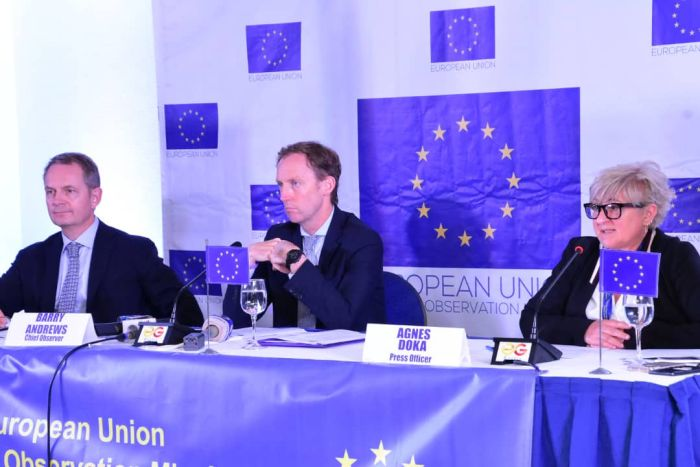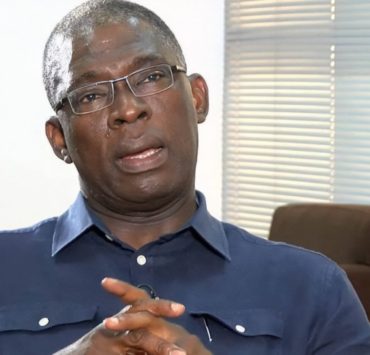INEC Dashed Public Trust, Lack Transparency – EU’s Damning Verdict On 2023 Presidential Election

Lawyard is a legal media and services platform that provides…
The European Union Election Observer Mission to the 2023 general election in Nigeria (EU EOM) declared yesterday that the February 25 presidential election was marred due to multiple failures by the Independent National Electoral Commission (INEC).
According to the EU, the operational failures on the part of INEC were due to operational deficiencies and lack of transparency, among others.
The EU chief observer and head of the delegation, Barry Andrews, told a news conference in Abuja while presenting the Mission’s final report on the election that the “election exposed enduring systemic weakness and therefore signal a need for further legal and operational reforms to enhance transparency, inclusiveness, and accountability”.
Although he noted some improvements in the conduct of the election, especially the deployment of technology such as the Bimodal Voter Accreditation System (BVAS) and the INEC Results Viewing Portal (IReV), he however lamented that the 2023 general election did not ensure a well-run transparent and inclusive democratic process as assured by the INEC.
He added that public confidence and trust in INEC were severely damaged during the presidential poll and was not restored on elections at the state level on March 18, leading civil society organisations to call for an independent audit of the entire process.
Andrews noted: “Early in the process, while enjoying a broad stakeholder trust, INEC introduced a series of positive measures to strengthen the conduct of the elections. However, closer to the polls some started to doubt INEC’s administrative and operational efficiency and in-house capacity.
“Public confidence gradually decreased and was severely damaged on 25 February due to its operational failures and lack of transparency. While some corrective measures introduced before the March 18 elections were effective, overall trust was not restored”.
He explained that the introduction of Bimodal Voter Accreditation System (BVAS) and the INEC Results Viewing Portal (IReV) was widely seen as an important step to ensure the integrity and credibility of the elections.
The chief observer said however that in practice, multiple missteps and lack of transparency before the polls, compounded by severely delayed display of the presidential result forms, dashed the public trust in election technologies used.
The member of EU Parliament said further stated: “INEC failed to give a timely and comprehensive explanation for the failures of 25 February , hence the improved online display of results forms from the 18 March state elections just fuelled further speculations about what exactly caused the delays after the presidential poll.
“On February 25 voting was critically delayed by the late arrival of sensitive materials and, during the early stages of the collation, presidential results form from polling units were not displayed real-time on the IRev as committed by the INEC and anticipated by all stakeholders.
“A critical failure in the entire election process manifested at the collation stage on 25 February, due to widespread disorganisation, lack of adherence to the prescribed procedures and an unsuitable environment. By the time of the declaration of presidential results, one quarter of the results forms were still missing from the IReV, and a significant percentage of the forms uploaded on IReV, often needed for comparison with manual results, were not legible.”
EU further said with the aim of contributing to the improvement of future elections in Nigeria, the EU EOM is offering 23 recommendations of which six are given priority for consideration by the Nigerian authorities.
“We are particularly concerned about the need for reform in six areas which we have identified as priority recommendations, and we believe, if implemented, could contribute to improvements for the conduct of elections,” Andrews added.
The six priority recommendations include efforts to remove ambiguities in the law; establish a publicly accountable selection process for INEC members; ensure real-time publication of access to election results; provide greater protection for media practitioners; address discrimination against women in political life and punish impunity regarding electoral offenses.
The chief observer pointed out that “importantly, there is a need for political will to achieve improved democratic practices in Nigeria.
“Inclusive dialogue between all stakeholders on electoral reforms remains crucial. The European Union stands ready to support Nigerian stakeholders in the implementation of these recommendations,” he added.
He lamented that the EU recorded 101 violent incidents during the campaign, including at least 74 fatalities, adding that assassination attempts and killings increased closer to the poll creating a particularly insecure environment in the southern states and also several northern states.
But in a swift reaction to the EU report, INEC defended the conduct of the 2023 polls, insisting that irrespective of the challenges, there were many positives in the election, even as it assured that the Commission was going to harmonise the EU recommendations with that of other election observers.
INEC Commissioner in charge of voter education, Festus Okoye, said, “Even from the reports presented you can see that the EU made mention of the fact that there has been significant improvement in our electoral process and there have been so many positives in this election.
“You had one of the positives that we registered over 93 million Nigerians during this election. Not only that, if you look at all the reports that have been submitted you can see that in all the reports domestic and international observers attested to the facts that in terms of voter accreditation, the BVAS performed optimally. So, there is no issue with the BVAS.
“Second, in terms of the Senatorial election, in term of the House of the Representatives elections, the governorship election and also in terms of the state houses of assembly election, you can see that almost all the domestic and international observers’ made mention of the fact that there were significant improvements in the conduct and management of the elections.”
Okoye however recalled the challenges that confronted INEC such as insecurity and violence against its staff, stressing that INEC will try to address the administrative lapses noticed during the elections.
Lawyard is a legal media and services platform that provides enlightenment and access to legal services to members of the public (individuals and businesses) while also availing lawyers of needed information on new trends and resources in various areas of practice.













